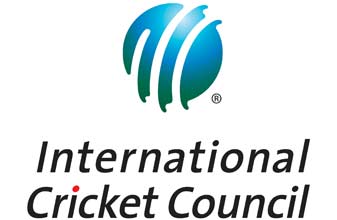Kuala Lumpur – Malaysia, June 27, 2012: The ICC Board met on 26 and 27 June during the ICC Annual Conference week in Kuala Lumpur. Among the decisions made and reports received were:
Promotion of Cricket
After receiving detailed match data and consumer research, the Board agreed with ICC’s Chief Executives’ Committee (CEC) that there should be continued and consistent emphasis placed on the promotion of the three formats of international cricket, particularly 50-over cricket. At the same time it was decided that, in conjunction with the changes in playing regulations, there should be further consideration of the branding of ODI cricket, while being cognizant of the high level of interest in 50-over cricket in many countries.
When considering the appeal of the 50-over format, the Board approved the recommended regulation changes including that Powerplays be restricted to the first block of 10 overs and a batting Powerplay of five overs to be completed before the start of the 41st over; a maximum of four fielders to be allowed outside the 30-yard circle in the non-Powerplay overs and the number of permitted short pitched balls should increase from one per over to two. There was also no objection to the introduction of Day/Night Test cricket dependent on the agreement of both participating teams.
Integrity issues
Following the recent decision of the ECB’s Disciplinary Panel in the anti-corruption proceedings brought against Danish Kaneria and Mervyn Westfield, the ICC Board unanimously acknowledged and agreed that the ICC and every Full, Associate and Affiliate Member should recognise and respect the sanctions imposed by the ECB’s Disciplinary Panel on those players, including by enforcing and giving effect to them within their own jurisdictions to the fullest extent permitted by law.
Both Bangladesh Cricket Board (BCB) and Sri Lanka Cricket (SLC), who have yet to implement a domestic anti-corruption code, advised that they will have such a code in place by 15 August, 2012.
The ICC Board received the annual report from Sir Ronnie Flanagan, the Anti-Corruption and Security Unit Chairman, and he repeated the need for the ICC to remain extra vigilant in the area of anti-corruption and also maintain the current high level of education. Following the recommendations made in the De Speville report as to the capability of the ICC’s ACSU, Sir Ronnie told the ICC Board that the ACSU had increased its resources. He also repeated the desire for Governments to put in place criminal legislation to protect against deliberately under-performing for personal gain and noted that progress had been made in this area in Australia.
Other decisions
Whilst approving the recommendations of the CEC relating to the inclusion of Hot Spot cameras as part of the minimum specifications for the Decision Review System (DRS) and the amendment of the LBW protocols regarding the “margin of uncertainty”, the ICC Board agreed to continue with the present arrangement where the two competing nations in a bi-lateral series decide on the use of DRS.
The ICC Board also agreed to continue the fruitful informal discussions surrounding the ICC Independent Governance Review and the role of the ICC. These informal discussions will continue and a further detailed debate will take place at the ICC’s next Board meeting in October in Sri Lanka. They also continued the important debate on the protection and promotion of international cricket within a changed landscape that is showing a growing number of domestic professional T20 leagues.
HRH Prince Tunku Imran of Malaysia, the Chairman of the Commonwealth Games Federation, made a presentation to the ICC Board on the 2018 Commonwealth Games on the Gold Coast in Australia and the 2017 Commonwealth Youth Games in St Lucia.
The Board also approved a $500,000 per annum grant from the Targeted Assistance and Performance Programme (TAPP) to both Cricket Ireland and Cricket Scotland in the expectation of matched funding. TAPP is aimed at developing more competitive teams among Full and Associate/Affiliate Members. TAPP is an initiative established under the ICC Strategic Plan 2011-2015 Building a bigger, better global game.
The ICC Board consists of the chairman or president from each of the 10 Full Members plus three elected Associate Member representatives. Also present at ICC Board meetings is the ICC President, who chairs proceedings, the ICC Chief Executive and the ICC Vice-President, as well as, by invitation of the President, the ICC Principal Advisor.
Sharad Pawar ICC President
Alan Isaac ICC Vice-President
Haroon Lorgat ICC Chief Executive
Zaka Ashraf Pakistan
Dr Willie Basson South Africa
Peter Chingoka Zimbabwe
Giles Clarke England and Wales
Upali Dharaasena Sri Lanka
Wally Edwards Australia
Dr Julian Hunte West Indies
Mustafa Kamal Bangladesh
Imran Khwaja Associate Member Representative
Chris Moller New Zealand
Keith Oliver Associate Member Representative
Neil Speight Associate Member Representative
Narayanaswami Srinivasan India. —- ICC


Leave a Reply
You must be logged in to post a comment.